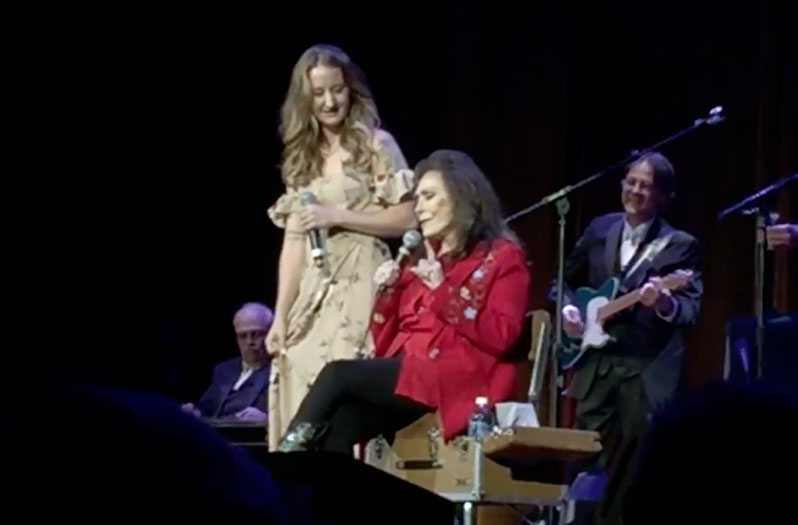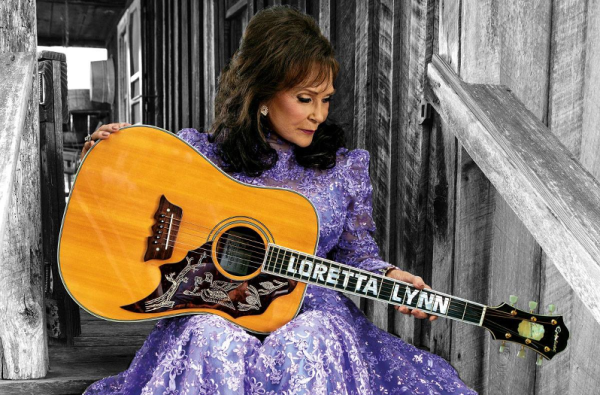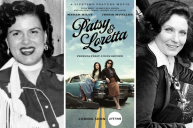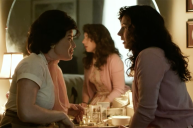Every country fan knows the story of Loretta Lynn. She's one of the genre's greatest singers and songwriters, whose honest and poignant songs helped change the face of country music. Born in a Kentucky Holler, she rose to fame. She became not only a counter superstar, but an American icon. But beyond the mythology of the Coal Miner's Daughter, there are stories that tell us who Loretta Lynn is as a person. Here are five Loretta Lynn stories that capture her legacy.
5. She wrote some of her first hits on a $17 guitar
By the time Loretta Lynn made her stage debut in Blaine, Washington, she had taught herself how to play guitar while raising a house full of kids. Lynn's husband Oliver "Doolittle" Lynn bought her a $17 Gibson guitar from Sears and Roebuck in 1953. Doolittle encouraged Lynn to start playing in local clubs near their home. She soon got a weekly gig playing every Saturday night.
According to the PBS documentary Loretta Lynn: Still a Mountain Girl, she wrote the lyrics to her first hit "Honky Tonk Girl" while working in a strawberry field, taking inspiration from a woman she'd seen in the bar at one of her shows.
4. She's a successful business magnate
We all know Loretta Lynn is self-motivated. After all, she she and her husband self-promoted her first single "Honky Tonk Girl" by driving across the country and stopping at nearly every country radio station between Washington and Nashville. But aside from building an incredibly successful recording career, she also created one of the most popular attractions in Tennessee. The Loretta Lynn Ranch at Hurricane Mills features Lynn's mansion (which is said to be haunted), the Coal Miner's Daughter Museum and a recreation of her Butcher Holler homeplace. Ever an open book, Lynn's ranch allows her fans from all over the globe to get a glimpse into her life.
3. Strength through tragedy
After nearly 50 years of marriage, Lynn lost her husband Doolittle Lynn when he died of congestive heart failure in 1996. She had spent the previous four years at home caring for him, spending nearly every moment at his bedside. While her husband was ill, Lynn also suffered the tragic loss of two of her brothers, her son and her close friend and singing partner Conway Twitty. Soon after losing Doolittle, Lynn's longtime producer Owen Bradley and close friend Tammy Wynette also passed away. Though she was grieving, she knew that the only way through her heartbreak was to get back on the road. She also recorded her album Still Country in the aftermath of losing her husband and dear friends.
Last year, while in the middle of a tour, Lynn suffered a stroke. But the country legend has worked hard to recover. She even appeared onstage to honor Alan Jackson at his Country Music Hall of Fame induction.
Lynn recently broke her hip in a fall, but given her strength she's sure to be back on stage as soon as possible
2. Her friendship with Patsy Cline
When Loretta Lynn first moved to Nashville, Patsy Cline was one of her greatest heroes. When Cline was in the hospital after a near fatal car wreck, Lynn sang Cline's "I Fall to Pieces" on the Midnite Jamboree and dedicated the performance to Cline. Cline heard the performance and was so touched by the act that she invited Lynn to come to the hospital to meet her. The two became best friends. Cline took Lynn under her wing, helping her navigate the music business and stand up for herself.
In 2000, Lynn told the Nashville Scene that her friendship with Cline made her tougher.
"After I met Patsy, life got better for me because I fought back," she said. "Before that, I just took it. I had to. I was 3,000 miles away from my mom and dad and had four little kids. There was nothin' I could do about it. But later on I starting speakin' my mind when things weren't right."
1. Her fearlessness
Lynn became a beacon for working class women of the 1960s and 70s, recording songs like "The Pill," "Don't Come Home a-Drinkin' (With Lovin' On Your Mind)," "Rated X" and "One's on the Way," which showcased real life experiences, double standards and challenges women faced. Lynn was a relatable figure who addressed often overlooked blue collar issues.
Her song "Dear Uncle Sam" was one of the first country songs to address the Vietnam War.
It may be difficult to imagine today, but in the '60s and '70s, many of Lynn's songs were extremely controversial. Some were even initially banned from radio. But being controversial was never her intent. She was simply telling the truth. And listeners appreciated it.





